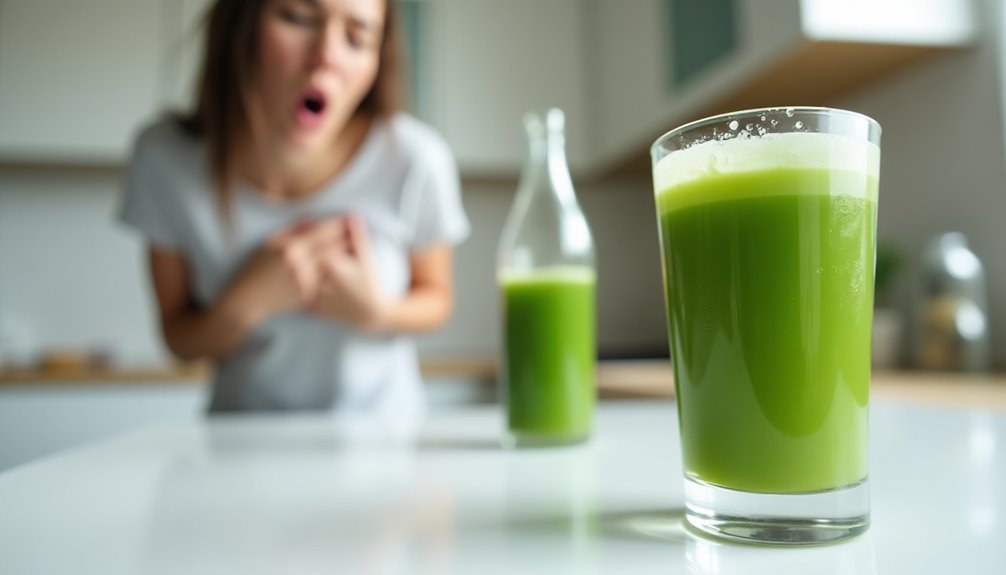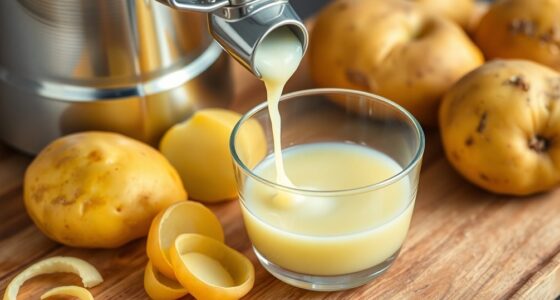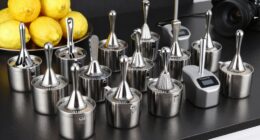If you experience diarrhea after drinking celery juice, it usually lasts from a few hours to a couple of days. The duration really depends on your gut health and sensitivity to mannitol, a sugar alcohol in celery. Some people may feel the effects stronger, especially those with sensitive digestive systems or IBS. It's essential to monitor how you react. To find out more about managing your intake and understanding your body's responses, stick around for additional tips.
Key Takeaways
- Diarrhea from celery juice can last from a few hours to a couple of days, depending on individual gut health.
- The duration of diarrhea may vary based on personal digestive sensitivity and overall health status.
- Monitoring your body's response to celery juice is crucial for understanding how long diarrhea may last.
- Gradually increasing celery juice intake can help gauge tolerance and minimize gastrointestinal reactions.
- Persistent diarrhea after consuming celery juice should prompt consultation with a healthcare professional for further evaluation.

Have you ever wondered why some people experience diarrhea after drinking celery juice? It's a question many ask, especially since celery juice has become a popular health trend. The truth is, the answer often lies in its high mannitol content. Mannitol is a sugar alcohol that can draw excess water into your intestines. For some individuals, this can lead to unexpected bowel movements or even diarrhea shortly after consumption.
When you drink celery juice, your body might respond by increasing the water content in your intestines, which can result in a laxative effect. If you've got a sensitive digestive system, you might find that this reaction is more pronounced, leading to diarrhea that can last anywhere from a few hours to a couple of days. Your overall gut health plays a significant role in how your body reacts to celery juice. If your gut is already a bit sensitive, you might want to tread carefully.
People with Irritable Bowel Syndrome (IBS) or those who are sensitive to sugar alcohols are particularly at risk for experiencing diarrhea after drinking celery juice. If you fall into this category, it's a good idea to monitor your digestive responses closely. Keeping track of how your body reacts to different foods, including celery juice, can help you identify potential irritants and adapt your diet accordingly.
It's essential to listen to your body, as it can provide valuable insights into what works for you and what doesn't. If you notice that the diarrhea persists or worsens after consuming celery juice, consulting a healthcare professional is highly recommended. They can help assess your situation and provide tailored advice based on your individual health needs.
It's crucial not to ignore ongoing digestive issues, as they could indicate a more significant problem that requires attention. In some cases, the diarrhea caused by celery juice may only be temporary, but it's essential to understand your own sensitivity levels. Everyone's digestive system is different, and what works for one person may not work for another.
If you're new to drinking celery juice, consider starting with a small amount and gradually increasing it to see how your body reacts. This method will help you gauge your tolerance without overwhelming your system.
Ultimately, while celery juice can offer various health benefits, it's essential to be aware of its potential side effects, particularly diarrhea. By monitoring your digestive responses and seeking guidance from a healthcare professional when necessary, you can make informed choices about incorporating celery juice into your diet.
Frequently Asked Questions
Is It Normal to Have Diarrhea After Celery Juice?
Yes, it's normal for some people to experience diarrhea after drinking celery juice.
Its high mannitol content can draw extra water into your intestines, leading to loose stools. If you've got irritable bowel syndrome (IBS), you might notice this effect even more.
While your digestive system may adjust over time, if diarrhea lasts more than a few days, it's best to consult a healthcare professional for advice.
How Long Does It Take to Digest Celery Juice?
Like a quick flash of lightning, celery juice zips through your digestive system!
Typically, it takes about 30 minutes to 2 hours for your body to digest it, but this can vary based on your metabolism and digestive health.
The juice's high water content speeds up gastric emptying, so you might notice quicker bowel movements.
If you're sensitive, though, be prepared for potential digestive surprises after enjoying your refreshing drink!
Why Do I Feel Weird After Drinking Celery Juice?
You might feel weird after drinking celery juice because it can act as a natural laxative.
Its high mannitol content pulls water into your bowels, leading to digestive discomfort. If you've got sensitivities or conditions like IBS, you may experience heightened symptoms.
Drinking it on an empty stomach can intensify these effects too, as there's nothing else to buffer its impact on your digestive system.
Listen to your body and adjust your intake accordingly.
How Long Does Celery Stay in Your Stomach?
When you consume celery, it typically stays in your stomach for about 30 minutes to 2 hours.
This timeframe can vary based on your individual digestive processes and gut health. Since celery is high in water and fiber, it often moves through your stomach quicker than denser foods.
Conclusion
If you've experienced diarrhea from celery juice, you're not alone. While some may find relief in its detoxifying properties, others may face temporary discomfort. Remember, your body reacts differently, so listen to it. Give yourself time to adjust, stay hydrated, and consider moderation. Just as celery juice can cleanse, it can also challenge your system. Embrace the journey of understanding your body, and you'll discover what works best for you in the long run.
Cindy thoroughly researches juicing trends, techniques, and recipes to provide readers with practical advice and inspiration. Her writing style is accessible, engaging, and designed to make complex concepts easy to understand. Cindy’s dedication to promoting the advantages of juicing shines through her work, empowering readers to make positive changes in their lives through the simple act of juicing.











